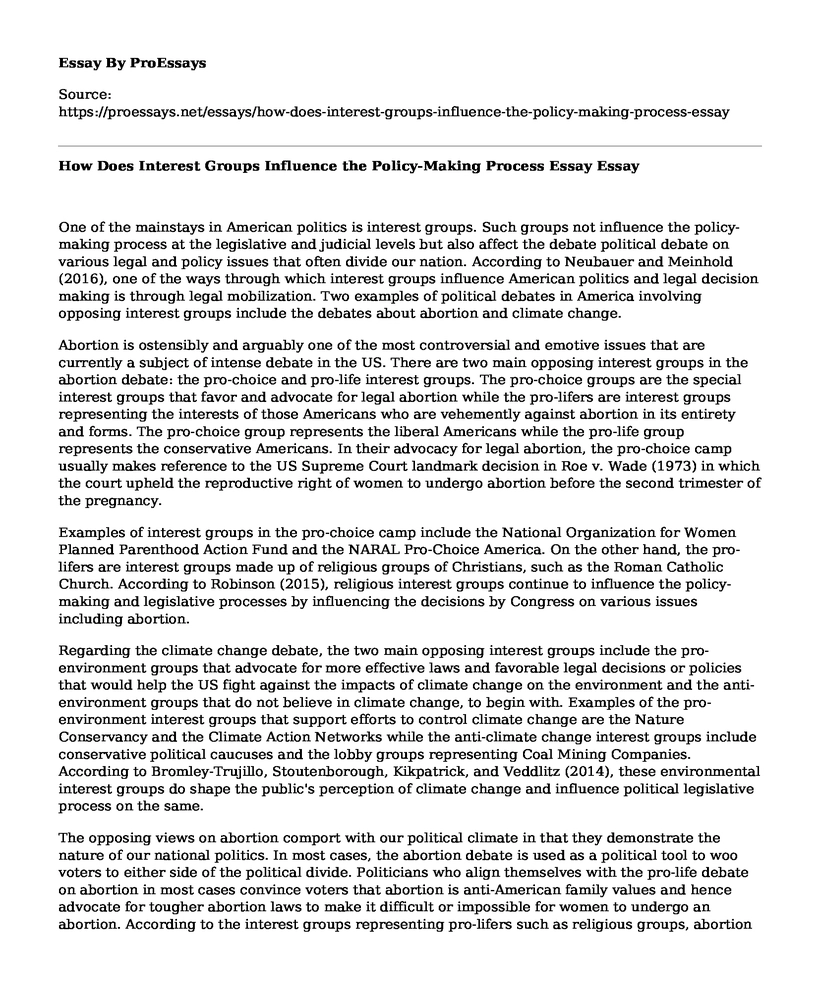One of the mainstays in American politics is interest groups. Such groups not influence the policy-making process at the legislative and judicial levels but also affect the debate political debate on various legal and policy issues that often divide our nation. According to Neubauer and Meinhold (2016), one of the ways through which interest groups influence American politics and legal decision making is through legal mobilization. Two examples of political debates in America involving opposing interest groups include the debates about abortion and climate change.
Abortion is ostensibly and arguably one of the most controversial and emotive issues that are currently a subject of intense debate in the US. There are two main opposing interest groups in the abortion debate: the pro-choice and pro-life interest groups. The pro-choice groups are the special interest groups that favor and advocate for legal abortion while the pro-lifers are interest groups representing the interests of those Americans who are vehemently against abortion in its entirety and forms. The pro-choice group represents the liberal Americans while the pro-life group represents the conservative Americans. In their advocacy for legal abortion, the pro-choice camp usually makes reference to the US Supreme Court landmark decision in Roe v. Wade (1973) in which the court upheld the reproductive right of women to undergo abortion before the second trimester of the pregnancy.
Examples of interest groups in the pro-choice camp include the National Organization for Women Planned Parenthood Action Fund and the NARAL Pro-Choice America. On the other hand, the pro-lifers are interest groups made up of religious groups of Christians, such as the Roman Catholic Church. According to Robinson (2015), religious interest groups continue to influence the policy-making and legislative processes by influencing the decisions by Congress on various issues including abortion.
Regarding the climate change debate, the two main opposing interest groups include the pro-environment groups that advocate for more effective laws and favorable legal decisions or policies that would help the US fight against the impacts of climate change on the environment and the anti-environment groups that do not believe in climate change, to begin with. Examples of the pro-environment interest groups that support efforts to control climate change are the Nature Conservancy and the Climate Action Networks while the anti-climate change interest groups include conservative political caucuses and the lobby groups representing Coal Mining Companies. According to Bromley-Trujillo, Stoutenborough, Kikpatrick, and Veddlitz (2014), these environmental interest groups do shape the public's perception of climate change and influence political legislative process on the same.
The opposing views on abortion comport with our political climate in that they demonstrate the nature of our national politics. In most cases, the abortion debate is used as a political tool to woo voters to either side of the political divide. Politicians who align themselves with the pro-life debate on abortion in most cases convince voters that abortion is anti-American family values and hence advocate for tougher abortion laws to make it difficult or impossible for women to undergo an abortion. According to the interest groups representing pro-lifers such as religious groups, abortion is not only against Christian values such as the sanctity of life but also violate fundamental conservative American values. However, the pro-choice interest groups also represent political interests that advocate and lobby for laws allowing women to have their privacy or reproductive rights respected and for their right to choose to be upheld. In a similar vein, the two opposing views on climate change comport with our political climate in that they demonstrate the extent to which American politics is not only based on but also influenced largely by competing policies and interests. For, climate change is almost always a hot topic in every electioneering period whereby American politicians use it as a calling card to woo voters to their camps.
Conclusion
In summary, the two opposing interest groups on both abortion and climate change debate are thus a quintessential representation of how American political system or climate works in that it is influenced heavily by diverse social, political, and economic interests. The two political debates indicate the diverse nature of the American political climate or system.
References
Bromley-Trujillo, R., Stoutenborough, J.W., Kikpatrick, K.J., & Veddlitz, A. (2014). Climate scientists and environmental interest groups: The intersection of expertise and advocacy.Politics, Groups, and Identities, 2(1), 120-134
Neubauer, D.W., & Meinhold, S.S. (2016). Mobilizing the law: Litigants, interest groups, court cases, and the media (pp. 168-210). In David, W.N. & Stephen, S.M., Judicial process: Law, courts, and politics in the United States. Boston, MA: Cengage Learning
Robinson, Z. (2015). Lobbying in the shadows: Religious interest groups in the legislativeprocess. Emory Law Journal, 64, 1041-1102
Cite this page
How Does Interest Groups Influence the Policy-Making Process Essay. (2022, May 17). Retrieved from https://proessays.net/essays/how-does-interest-groups-influence-the-policy-making-process-essay
If you are the original author of this essay and no longer wish to have it published on the ProEssays website, please click below to request its removal:
- Donald Trump's Presidential Announcement Speech
- The Surge of Nationalism: Race, Nationalism, and War Essay Example
- Diplomacy and War - An Analysis of US Iraq War
- Essay on Victorian Gov't & Posh Op Shop Support Integration of Children With Disabilities
- U.S. Drug Control Policy: Slowly Learning the Hard Way & Its Implications for Mexico - Annotated Bibliography
- Socialism: Sharing Resources, Political Goodwill & Communism - Essay Sample
- Essay on Examining US Aggregate Demand & Supply and Policy Impacts (1990s-2000)







